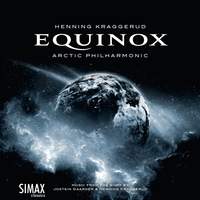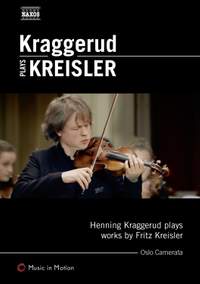Interview,
Henning Kraggerud on Mozart
 Violinist Henning Kraggerud's previous album, Equinox, showed his skill and originality as a composer. For his latest release, he's returned to the soloist's podium to perform three of Mozart's violin concertos - with his own freshly-written cadenzas.
Violinist Henning Kraggerud's previous album, Equinox, showed his skill and originality as a composer. For his latest release, he's returned to the soloist's podium to perform three of Mozart's violin concertos - with his own freshly-written cadenzas.
In reading his notes on the performances, I realised that Kraggerud has a lot to say about the nature of what a piece of music actually is - how the creative work is shared between the composer and the performer, for instance - so I couldn't resist getting in touch with him to explore this profound and often controversial topic further. Here's what he had to say…
Your notes accompanying this disc mention the breadth of your approach when thinking about performance – you draw on a wide range of sources of inspiration. So how did you go about the process of composing the new set of cadenzas for these concertos?
I have written six cadenzas for this CD and one extra for the upcoming live DVD, where the Adagio in E is also included. These have been composed and revised at different stages throughout my career, but mostly, I start by improvising over all the different motifs from each movement, and record and listen to that before improvising more to collect ideas, both on violin and at the piano. I also combine ideas from the concerto and compose new versions based on the motifs from the concerto, but over harmonies from other places in the work, or other works by the composer. I also try out new paths in the themes, turn them upside down, change tonality from major to minor, etc. A few times, I have used the more classical approach of writing a tonal cadenza (row of harmonic progression) or expanded ones inspired by the piece, and used that as a starting point. I have by the way just finished writing two cadenzas for Clemens Hagen, for Haydn’s D Major Cello Concerto (to be recorded this autumn) and my cadenzas for him for the Haydn C Major Concerto have been recorded and will soon be released on Simax with the orchestra 1b1.
Your claim that “the true sign of a masterpiece must lie in the number of possible interpretations inherent in it” is, surely, rather contentious. Doesn’t this give a favoured position to those works where more is left to the performer’s creativity – particularly in earlier styles where a cadenza, or decisions concerning ornamentation, allow (indeed require) an individual to place their stamp on the music?
Maybe even more freedom exists in pieces in the baroque or classical period in the actual notes to be played, but even when a composer specifies all notes to be played, there is an infinite amount of possible interpretations. As artists, we should also think: what is our responsibility? Is it to follow every little sign in the manuscript, or to create the best possible interpretation we can? Other genres of music such as Jazz and Pop even make cover versions, so why are we obsessed by following every little sign? And why are classical composers today writing much more interpretative signs into the scores than in earlier days?
Actually listening to composers playing their own works, it is very seldom they follow what they have written, and especially in the cases where the composer was a great artist as well. In most cases dealing with living composers, they have granted me the right to do these kind of things and say they even like it (some have changed the scores) and I am not going to change my behaviour just because the composer happens to be dead. César Franck changed the Tempo marking when playing his sonata, because as he said, Ysaÿe picked a much better tempo. In other words, the first movement was a better piece than Franck had imagined, and he was wise enough to realise this when he heard and felt it.
I know a lot of composers maybe want to play God and decide everything, but as I listen to living composers it is relatively seldom I think they have the best interpretations of their own work. Let’s say a composer is great but you think it a bit pompous, when he conducts his own just as he has imagined, and even claims to be very satisfied afterwards. Then another great conductor likes the work, but brings out something different in it, and perhaps brings something of herself to it as well. The work suddenly feels to you like it has more dimensions. Is she then wrong? Or has she just made this to be a truly living art form, contributing great things not even the composer had thought about, but which nevertheless were there to be found within all the notes of the score?
Also, lots of things have happened since a composer like Mozart died. What was normal hundreds of years ago could today be a statement, and vice versa. Something such as playing without vibrato will likely not be heard the same way now, when people are more used to hearing music with vibrato, as in Mozart’s time, when I believe vibrato would be more of a special effect.
Indeed, there are those who would argue precisely the opposite – that the composer’s job, even in a concerto, is to compose the whole piece, not leave some of the job to the performer! What would you say to such a counter-claim?
That would take all the fun out of it for me! Why not write for computers then? When advising Clara Schumann about writing metronome markings, Brahms commented that she should play for three minutes, count how many bars she had reached, and divide to find the metronome mark … which is therefore just an average tempo. I find today, many people do not know about these and similar quotes, and hence by playing merely what’s printed, we probably don’t follow most composers’ intentions with a mentality to accuracy which probably started around the 1950s. I do not want the so-called Urtext editions to be treated like orthodox religions either. The real work is the possible music behind the notes in my view. Anything of the greatest value can maybe only be hinted at.
Brahms is also reported to have said that he wouldn't want to deprive the great musicians of the freedom of interpretation, and that the bad ones couldn’t be helped by him writing in all sorts of instructions and markings anyway.
The Norwegian Author Jens Bjørneboe wrote something like: "It is no coincidence that most languages on earth have a proverb, much like ‘to take a liberty’.” So let’s not wait for someone to give us our freedom. In the end, if we think of ourselves just as humble servants to the great composer’s mind, and do not really get involved with the music with the whole of ourselves, then classical music will continue to be marginalised.
You also allude to some dissatisfaction with the current system of auditions and competitions, where almost the only hope of success seems to be to play in the style that the jurors are known to like, at the expense of one’s own artistic imagination. This does indeed sound very stifling – but what methods do you see for improving things in this area?
Important questions. I know that the very best orchestras in the world look for other things when hiring. A violinist who almost got a job with the Berlin Philharmonic asked why it was not good enough, and the answer was "you do not play individualistically enough.” But with many good orchestras, I also know a lot of great musicians who have been rejected because the jury or hiring committee were afraid they would not blend well into the group, or played too much like a soloist. So I think in a lot of cases, orchestras might be hiring the people who fit into the orchestra, rather than those who might bring it to the next level. I have discussed this with many conductors who agree, as well as a few who are sceptical of this hypothesis.
What I do know is that when leading an orchestra, I always get help from those musicians who really show a will and a personality of their own, and the best result always comes when you can get the best out of a lot of potential, not by avoiding challenge. So when I sit on a jury or similar, I always try to discuss with my colleagues and maybe ask them simple things like: were you moved by this? I would much rather be moved in my heart and hear a few notes out of tune, than be bored by meaningless perfection. Of course, sometimes they can blend perfectly together, but even then in the best cases, my focus is drawn to the spirit of the music.
To return to your question, I do not think you can be ever wiser than yourself - you must trust your at the moment preferred interpretation. If you start to think about what the juror (or audience, or critic) might like, and then change your interpretation accordingly, it might get you the job (or maybe not, since jurors are humans with their own thoughts and feelings as well). But surely this approach is, regardless of results, a step on the road away from yourself?
Henning Kraggerud's new recording of Mozart's Violin Concertos Nos. 3, 4 & 5 with the Norwegian Chamber Orchestra was released in May.
Available Formats: CD, MP3, FLAC, Hi-Res FLAC
Other recent recordings by Henning Kraggerud
Kraggerud's own composition 'Equinox', based on the Earth's 24 time-zones and the musical keys, was released last year on Simax (and receives its UK premiere in Manchester this October).
Available Formats: CD, MP3, FLAC, Hi-Res FLAC
An audio-visual exploration of the works of Fritz Kreisler, performed on the composer's own violin and accompanied by the Oslo Camerata.
Available Format: DVD Video





